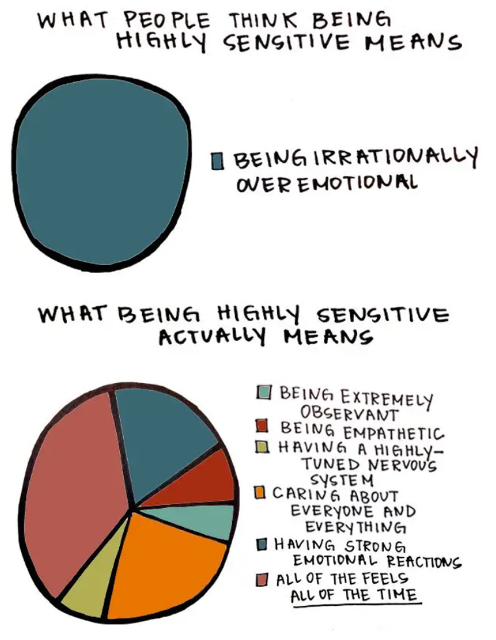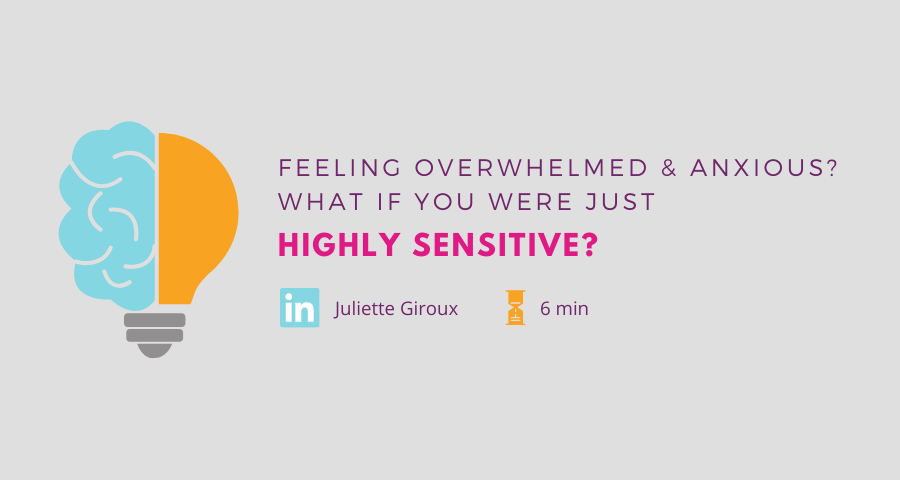Today, it is time to acknowledge the link between self-knowledge and mental health. I believe both are strongly connected. Knowing ourselves helps taking care of our mental health as well as discovering mental health issues we didn’t even know we struggled with. Just a little disclaimer: I am not talking about mental illness, but about non-severe mental health issues. However, you do not need to have a clinical pathology to struggle in certain situations or periods of your life. In particular, I want to talk about one trait that can cause you to struggle more than other people: high sensitivity, also called over- or hyper-sensitivity.
If you’ve ever heard sentences like: “you’re such a drama queen”, “why are you making a big deal out of nothing?”, “don’t take things so personally” or simply “you’re too much”, the following paragraphs might interest you. If you’ve never heard this type of sentences: congrats, you probably don’t suffer from high sensitivity. BUT, that doesn’t mean you shouldn’t read this article. It is estimated that as many as 1/5 people are highly sensitive. That makes it very likely for you to know several highly sensitive persons. You might even date one, raise one or live with one. Therefore, it’s very important you understand their perspective to give them empathy and adjusted treatments.
WHAT IS HIGH SENSITIVITY?
A Highly Sensitive Person (HSP), is “someone who experiences acute physical, mental, or emotional responses to stimuli” (Source: highlysensitiverefuge.com).
Because 15 to 20% of the population is highly sensitive (that includes as many men as women), it is too common for it to be considered a disorder. However, it is not common enough for people to be sufficiently informed about it, and that’s why I’m writing this article.
In practice, what the previous definition implies, is that HSPs sense a greater number of nuances in their environment, causing them to be aware of more, but also causing them to get very easily overwhelmed. In some way, it is both a blessing and a curse. For example, HSPs are very empathetic which makes them great counselors, but they also tend to absorb other’s feelings and moods, causing them to be emotionally exhausted almost constantly. HSPs are more likely to get moved by music or visual arts, but they also get anxious when they hear a loud noise and frequently suffer from headaches caused by bright lights.
Back to our mental health argument from the beginning. What does high sensitivity have to do with mental health? Well, a lot of situations can cause HSPs to get anxious. Being so sensitive to stimuli, it is extremely hard for them to process too many at once. Partying or traveling can for example be seen as very stressful experiences for HSPs. Time pressure can also feel unbearable, and so on and so forth.

WHAT CAUSES PEOPLE TO BE HIGHLY SENSITIVE?
High sensitivity is caused by biology. It is a real, research-based psychological characteristic. Psychology considers anyone having a high degree of “Sensory Processing Sensitivity” as being highly sensitive. Sensory Processing Sensitivity is a genetically based trait that can be observed at the neural level. In a nutshell, high sensitivity is caused by a brain, that simply works a bit differently compared to the rest of the population. It cannot be developed from life experiences or trauma, as it is a genetic trait. Fun fact: high sensitivity can also be observed in many animal species!
Intellectual Giftedness (defined as an asynchronous development causing higher intellectual capacities (Source: educationaladvancement.org)) is also usually associated with high sensitivity. If you are gifted, chances are high you are also an HSP.
HOW TO DEAL WITH IT IN YOUR EVERYDAY LIFE?
I’ll split it into both perspectives: the one of the HSPs, and the one of the people that surround them.
If after reading the previous paragraphs you think you are highly sensitive – welcome to the club – you can start by taking this test, to proof check.
What can you now do with this information? Well, like any other self-knowledge discovery, it’s here to help you handle your life better. You cannot change yourself. High sensitivity is in your genes, and there is nothing you can do that will make it go away. What you can do however, is taming the bad and embracing the good side of it. When you feel anxious or overwhelmed, try putting your feelings into perspective and remembering that things feel this way not because they are horrible, but only because your brain interprets them in a very intense manner. Also remember that you are not going to feel these intense emotions forever, they are only a spontaneous response to a stimulus and within a few hours, you will be able to stabilize your emotional state again. However, my advice is only valid if you know enough about high sensitivity and its scope in the first place. So: start by researching it as much as possible. Then, talk about it with your loved ones, in order to teach them how they have to adjust their behavior to you. And finally, if things start to get a little too much, seek professional help, and try focusing on all the blessings that also come with being highly sensitive.
Now, if you are not highly sensitive, it’s still important to familiarize yourself with this trait. It will help you dealing with the HSPs you have or will have in your life. The most important, when you recognize signs of high sensitivity in someone, is to show empathy. Again, HSPs cannot stop being the way they are. Making them feel guilty by telling them some of the sentences I have shared at the beginning of this post, would only make things harder for them by increasing the number of stimuli they have to deal with. I can tell you from experience that being highly sensitive can make communication very hard, especially as a child. Feeling misunderstood is probably one of the biggest challenges HSPs have to face, so help them by being patient. Finally, if you think someone you know is highly sensitive, talk about it with them. Chances are high they don’t even know high sensitivity is a thing and they simply blame themselves for the way they are, while struggling to handle it. I used to be like that, and I wish someone would have informed me earlier about this trait. It would have made things so much easier for me, so please be this person for someone else and help raise awareness about this way too unknown topic.
I hope this post was able to inform you on high sensitivity, whether you have this trait or not. This shows you how important it is to know ourselves and the people around us. I cannot stress this enough: it is the only way you can take control over your reactions and you can successfully communicate them, in order to improve your relationships and your life in general! And if you are highly sensitive, don’t worry, so were Abraham Lincoln, Martin Luther King, Jr. or Mozart (Source: educationaladvancement.org).
Let me know in the comments below: did you know about high sensitivity before? Do you know anyone that probably has this trait? If so, how are you going to adapt your behavior from now on?
Don’t forget to follow me on LinkedIn to stay informed of the publication of my new posts, one every Tuesday.
And until then, take care!




Very interesting post ! I did not know what HSP meant when you were a child ! This would have helped me a lot in understanding your reactions better and I would probably have been a more comprehensive mum too. Sorry for this ! Mum
Hello Mum,
Thank you for this comment that particularly moved me <3
Hi Juliette, again very insightful and well-written article. I was intrigued to read that high sensitivity affects both men and women at the same rate, because usually there is this cliché that women tend to be more sensitive and emotional than men. Glad, that this is not the case. I don’t know if I would consider myself highly sensitive but I can definitely relate to some characteristics shown in the test such as the need to withdraw after a stressful day or not being drawn to loud music, large groups of people etc. – I really enjoy reading your articles and always learning something new about myself.
Hello Katharina,
Thank you for your feedback. I was surprised by this too. I think it comes from the fact that men are more likely to hide their emotions, or to express different types of emotions under the pressure of society (e.g. when they are sad they show anger since it’s more “manly” but that’s not the primary emotion they feel).
From what you describe I think you might be more introverted than highly sensitive. These two characteristics tend to be mistaken sometimes!
See you soon,
I do not know a person which have this feature but I think it’s important to take into acccount of this, during a conversation, or at work. Thank’s for this post Juliette, it’s very complete and interesting !
Hello Pauline,
Thank you for your feedback. Well, you do know someone now, because you know me! There are maybe more persons you know too, you just haven’t noticed. Maybe now that you know how to recognize the signs you will!
See you soon on the blog hopefully,
Thank you so much for this article, it’s really interesting.
And you’re right, say it louder, it’s not because we are not ”suffering” from high-sensitivity that we shouldn’t take it seriously. It’s important to be informed about it to react the right way with people who are, and to understand them.
Hello Laura,
Thank you so much for your positive comment.
I totally agree with that and I’m glad you think this way. If only more people did! That’s why knowledge is key.
See you next week I hope,
Great article, I can definitely relate to that (as you probably know 😉 ). Thanks Juliette !
Hello Justine,
I am happy to read a comment from someone who is an HSP too! I really hope this helped you and gave you more insights to understand yourself.
Have a great day and see you soon!
I loved this article, Juliette! Fantastic writing, as always. I took the test and I’m definitely not an HSP, but my mom and partner are. I’ve found myself being a bit helpless and impatient at times around them, but learning to be more sensitive as a non-HSP is definitely, definitely, crucial. Thank you for enlightening me!
Hello Olivier,
Thank you so much for your kind words. I am so happy to read this. HSPs definitely need some ajustements to be made by people that surround them and seeing people like you that care is so great. I’m sure they know how lucky they are to have you!
See you soon,